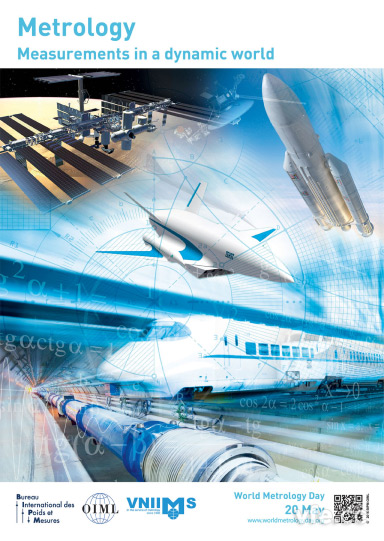國際計量局主席致辭2016年世界計量日_動(dòng)態(tài)世界中的計量
- 瀏覽次數:5981次
- 發(fā)布時(shí)間:2016/3/28 16:11:07
- 作者:hb_yinhe
日前�����,國際計量局主席致辭2016年世界計量日����,2016年世界計量日主題為“動(dòng)態(tài)世界中的計量”�,本文附中文翻譯和英文原版供大家參考�。
2016動(dòng)態(tài)世界中的計量
作為一名機械工程師����,我腦海里第一個(gè)想到是動(dòng)力學(xué)是應用物理學(xué)的一個(gè)分支�����,特別在經(jīng)典力學(xué)領(lǐng)域中��,關(guān)于力和扭矩及其對運動(dòng)影響的研究方面�����。動(dòng)力學(xué)的研究分兩類(lèi):線(xiàn)性的(如力�����、質(zhì)量/慣性,位移,速度,加速度和動(dòng)量)和旋轉(如轉矩��、慣性矩��、轉動(dòng)慣量����、角位移�、角速度���、角加速度和角動(dòng)量)��。通常�����,物體同時(shí)參與線(xiàn)性和旋轉運動(dòng)�����。
許多儀器在“動(dòng)態(tài)”法制計量學(xué)中被應用�����,舉例說(shuō)明:
自動(dòng)稱(chēng)重儀器:可以對運動(dòng)物體進(jìn)行稱(chēng)重的儀器�;
電表:測量電子的流動(dòng)的儀器��;
各種類(lèi)型的儀器:測量水流量的各種儀器���;
及其他各種液體流量��、氣體流量和計價(jià)器����。
然而在英語(yǔ)中����,“動(dòng)態(tài)”一詞不僅與運動(dòng)有關(guān)�,也與變化有關(guān)����。
一個(gè)運用在多種不同科學(xué)(如計量)和工程學(xué)科中的例子可以突顯這個(gè)連續性的和富有成效的“變化”����,那就是太空旅行���。1903年12月17日�����,萊特兄弟研制出第一架可控制的�����,具備持續自動(dòng)推進(jìn)功能的飛機�。1957年10月4日���,蘇聯(lián)將人造衛星1號送入軌道�,這是地球的第一顆人造衛星����。1969年7月20日���,在美國的阿波羅11號任務(wù)中實(shí)現了第一次載人登月�。1998年�,國際空間站(ISS)的第一個(gè)組件�,或居住的人造衛星��,投入低地球軌道����。2012年���,NASA的好奇號探測器成功登陸并對火星進(jìn)行探索��。最近��,2014年11月����,歐洲航天局的羅塞塔任務(wù)讓菲萊探測器著(zhù)陸在彗星上��。
計量領(lǐng)域發(fā)生了巨大的變化�,有關(guān)某些國際標準單位的定義工作���,諸如對于千克的新的定義已接近完成�����。為其他國際標準單位作出定義而改進(jìn)設備的研究持續獲得成功�����。
計量學(xué)如人類(lèi)文明一樣古老�����,它還在繼續不斷的變化�����,還能看到它在加速變化�,它仍然是動(dòng)態(tài)的���。參與到被我們稱(chēng)之為“計量”的工作的時(shí)刻是非常令人著(zhù)迷的�����。
2016動(dòng)態(tài)世界中的計量
當我們回顧第二十一個(gè)世紀的快速變化時(shí)��,我們可能會(huì )說(shuō)�����,“唯一不變的就是變化本身”�。對于計量工作的需要��,以及如何滿(mǎn)足這種需求�,對于任何人來(lái)說(shuō)都毫無(wú)例外�。而將一個(gè)穩定可靠和精準的測量系統所帶來(lái)的便利應用于動(dòng)態(tài)的世界無(wú)疑是一種挑戰�。
眾多新技術(shù)的運用滿(mǎn)足了許多社會(huì )需求���,從本質(zhì)上講�����,這是通過(guò)穩定和準確的計量才得以實(shí)現的���。無(wú)論是在一個(gè)高速運轉的磁盤(pán)驅動(dòng)器中���,還是在電網(wǎng)中可再生能源的供應和需求變化方面�����,或是推動(dòng)環(huán)境改善和提高航空航天工業(yè)的燃油效率方面����,準確掌握動(dòng)態(tài)量對應用高技術(shù)取得進(jìn)展是至關(guān)重要的�。動(dòng)態(tài)數量也在現有工業(yè)中扮演越來(lái)越重要的角色�,如火車(chē)和卡車(chē)的動(dòng)態(tài)稱(chēng)重和對汽車(chē)輪胎與發(fā)動(dòng)機的震動(dòng)與影響的監測��。
這類(lèi)動(dòng)態(tài)計量的運用帶來(lái)了特別的挑戰�。在日常應用中�����,將高度準確的�����、長(cháng)期穩定的標準同動(dòng)態(tài)原位計量技術(shù)結合起來(lái)是比較困難的�,其本身就需要偉大的創(chuàng )新�����。
想要讓我們的計量能力適用于動(dòng)態(tài)的世界還需要其他措施�����。對于“2018再定義計劃”來(lái)說(shuō)��,對國際單位制(SI)的未來(lái)需求將是一個(gè)關(guān)鍵驅動(dòng)力�����。這種變化將確保更大的全球普遍性的測量系統會(huì )帶來(lái)更多益處,并且在未來(lái)科學(xué)和技術(shù)革新中創(chuàng )造新的機遇��。
我們需要動(dòng)態(tài)的組織中處于動(dòng)態(tài)的人們來(lái)化解動(dòng)態(tài)世界中的計量問(wèn)題����。
2016Measurements in a dynamic world
As a mechanical engineer, the first thought that comes to my mind is that dynamics is a branch of applied physics, specifically the field of classical mechanics which is concerned with the study of forces and torques and their effect on motion. The study of dynamics falls under two categories: linear (quantities such as force, mass/inertia, displacement, velocity, acceleration and momentum) and rotational (quantities such as torque, moment of inertia/rotational inertia, angular displacement, angular velocity, angular acceleration and angular momentum). Very often, objects exhibit both linear and rotational motion.
Numerous instruments are utilized in “dynamic” legal metrology; some examples are:
automatic weighing instruments, which can weigh items while in motion;
electricity meters, which measure of the flow of electrons;
various types of instruments that measure the flow of water;
the flow of various other liquids and gases, and taximeters.
In English, however, the word “dynamic” relates not only to motion but also to change.
One example that highlights this continuous and productive change which encompasses many different sciences (including metrology) and engineering disciplines is space travel. On December 17, 1903 the Wright brothers made the first controlled, self-powered sustained flight. On October 4, 1957, the USSR placed in orbit the Sputnik 1, the first artificial satellite of Earth. On July 20, 1969, the first manned lunar landing was achieved by the United States’ Apollo 11 mission. In 1998 the first components of the International Space Station (ISS), or habitable artificial satellite, were put into low Earth orbit. In 2012, NASA’s Curiosity succeeded in landing on and exploring Mars. More recently in November 2014 the ESA’s Rosetta mission landed its Philae probe on a comet.
In the metrology community we are now seeing significant changes related to the definition of certain SI units as work on the new definition of the kilogram nears completion. Research continues to be successful in refining values and equipment used in the definition and the mise en pratique of other SI units.
While metrology, the science of measurement, is as old as human civilization it continues to constantly change; it continues to see forward acceleration and it continues to be dynamic. It is truly a fascinating time to be a part of this very dynamic work that we call “metrology”.
2016Measurements in a dynamic world
When we reflect on the rapid pace of change in the 21st century, we may say that “the only thing that is constant is change itself”. The needs for metrology, and how these needs are met, are no exceptions; it is a challenge to bring the benefits of a stable and accurate measurement system to a dynamic world.
Many of the needs of society are met by new technologies, and it is essential that stable and accurate measurements are available to underpin them.
The accurate knowledge of dynamic quantities is pivotal to progress in high technology whether it is the high-speed movements in a disk drive, the variations in supply and demand from renewable energy sources on electricity grids, or the drive for environmental improvement and fuel efficiency in the aerospace industry. Dynamic quantities also play an increasing role in established industries, such as the dynamic weighing of trains and trucks, and the monitoring of vibration and impact arising from the tyres and engines of cars.
These applications of dynamic measurement bring particular challenges. Linking highly accurate long-term stable standards to dynamic in situ measurements in everyday applications is difficult and itself requires great innovation.
Adapting our measurement capabilities to a dynamic world requires other steps too. The need to ‘future proof’ the International System of Units (the SI) is one of the key drivers for the redefinition planned for 2018. The changes will ensure the benefits of greater universality of the world’s measurement system, and open new opportunities for scientific and technological advances in the future.
We all need dynamic people in dynamic organisations to address the challenges of measurement in a dynamic world.



